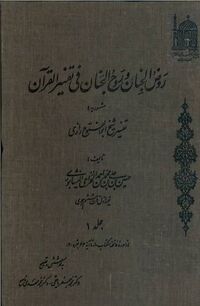Abu l-Futuh al-Razi, a remarkable figure in Shia scholarship, offers profound insights into the teachings of Islam through a critical lens. As one delves into his works, one may ponder: How do the intricate interpretations presented by al-Razi enrich our understanding of the Shia faith? This question invites exploration not only of his individual contributions but also of the broader implications they possess for Shia thought and practice.
Born in the 12th century, Abu l-Futuh al-Razi emerged as a pivotal commentator, whose writings reflect a synthesis of theology, philosophy, and jurisprudence. His magnum opus, “Rawdat al-Jinan,” serves as a compendium of Islamic teachings, specifically tailored to elucidate Shia perspectives. The text is notable for its rich literary style and thorough examination of doctrinal issues, making it an invaluable resource for scholars and laypersons alike.
One cannot discuss al-Razi’s contributions without acknowledging his emphasis on the foundational principles of Tawhid (the oneness of God). His approach encourages followers to engage in a nuanced understanding of Allah’s attributes. Rather than viewing God through a monolithic lens, al-Razi posits that the divine essence encompasses both mercy and justice. He challenges readers to reflect on how these attributes manifest in the world. Can we reconcile divine mercy with human suffering? This inquiry not only spurs intellectual engagement but also creates a space for critical self-reflection among believers.
Moreover, al-Razi’s exploration of the concept of Imamate is central to Shia theology. He articulates that the Imams are divinely appointed leaders, whose authority extends beyond mere political governance. By examining the lives of the Imams, al-Razi underscores their role as spiritual guides, possessing esoteric knowledge and moral impeccability. This assertion raises a tantalizing question: How do the teachings of the Imams inform contemporary ethical dilemmas faced by Shia Muslims today? As one wrestles with modern issues, such as social justice and environmental responsibility, the teachings of al-Razi invite a dialogue with the past.
Tags
Share this on:
[addtoany]


